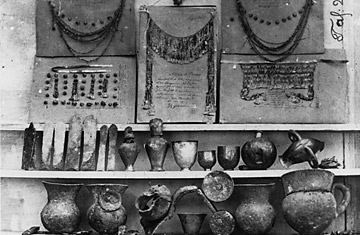
Germany's plunder during World War II was legendary, but with Priam's Treasure they were the victims.
Not that we should feel sorry.
German archaeologist Heinrich Schliemann discovered the artifacts — mostly gold, copper shields and weapons — in Anatolia 1837 and named them for Priam, king of Troy. Schliemann illegally smuggled the loot to Berlin, convinced he had found evidence of the Iliad's famed ancient city. But in a bit of karmic payback, Soviet soldiers stole the treasure from Berlin during the waning days of World War II, keeping their bounty a secret for decades until the artifacts turned up on display in Moscow in 1993.
Current Status: Russia is technically bound by a 1990 treaty that provides for the return of all pilfered art and artifacts back to Germany. But Russian museums are now stonewalling, saying they plan to keep the treasure as reparation for Germany's destruction of Soviet cities during the war.